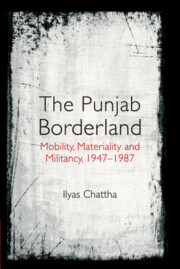Book contents
- Frontmatter
- Dedication
- Contents
- List of Figures
- List of Tables
- Preface and Acknowledgements
- Note on Transliteration
- List of Abbreviations
- Introduction
- 1 Making of the Border
- 2 Cross-Border Flows
- 3 Illicit Cities: Contraband Trade between Lahore and Amritsar
- 4 Illicit Global Gold Trade and Wagah–Attari Crossing
- 5 The Making of Contraband Culture: People and Poetics
- 6 The Regulation of Cross-Border Flows and State Patronage
- 7 Guns, Drugs and the End of the ‘Good Old Days’
- Conclusion: Between Open and Closed Borders
- Glossary
- Appendix
- Bibliography
- Index
Preface and Acknowledgements
Published online by Cambridge University Press: 30 November 2021
- Frontmatter
- Dedication
- Contents
- List of Figures
- List of Tables
- Preface and Acknowledgements
- Note on Transliteration
- List of Abbreviations
- Introduction
- 1 Making of the Border
- 2 Cross-Border Flows
- 3 Illicit Cities: Contraband Trade between Lahore and Amritsar
- 4 Illicit Global Gold Trade and Wagah–Attari Crossing
- 5 The Making of Contraband Culture: People and Poetics
- 6 The Regulation of Cross-Border Flows and State Patronage
- 7 Guns, Drugs and the End of the ‘Good Old Days’
- Conclusion: Between Open and Closed Borders
- Glossary
- Appendix
- Bibliography
- Index
Summary
The journey towards completing this book has been a long one. My early inspiration for this began shortly after completing my PhD under the mentorship of Ian Talbot, who taught me how to be a historian and to whom I owe a great intellectual debt for guiding me to think differently about South Asian history and partition studies. I believe this book is better thanks to his intellectual generosity and mentorship. The seeds of this book were planted in 2008 when during my PhD fieldwork, I stumbled across numerous documents in the several Thana Record Rooms in Punjab. They contained thousands of files and registers, revealing the 1947 partition-related events, the opposite of what I had expected to find. Partition and Locality (OUP 2012) was the outcome of my research of mulling over my sources. I have since dug more and realised the importance of local sources, not merely because it was part of my training (at Warwick and Southampton) to be as true as one could be to the voices of the past, and their relationships to power and subalterns, but because to go on and question everything we thought we ‘knew’.
There has been a proliferation of research on South Asian partition studies over the past decade, which reflects its centrality in the everyday interactions between the postcolonial state and its new citizens relating to refugee status, state practices over citizenship, and categories of identities and belonging in South Asia. This begs me whether the aftermath of Partition could be tested through a different lens than it has been. The Punjab Borderland is a pioneering work, both in its intellectual scope and its archival significance, and offers a fascinating insight into how the new international boundary between India and Pakistan was made, subverted and transformed. Dispelling the established historiographical narratives of an increasingly militarised border symbolic of interstate animosity, this book corrects these accounts by resurfacing narratives of border crossings and social relations built on mutual benefit and trust. A unique and timely analysis of the Indo-Pakistan borderland in the decades after independence, this book conceptualises the making of contraband as more than just a way for borderland societies to evade the state imposition of a partitioned geography on their lifeworlds but as a catalyst for enabling social mobility and political empowerment for the population involved and a thriving market for consumption in the urban centres.
- Type
- Chapter
- Information
- The Punjab BorderlandMobility, Materiality and Militancy, 1947–1987, pp. xv - xviiiPublisher: Cambridge University PressPrint publication year: 2022



